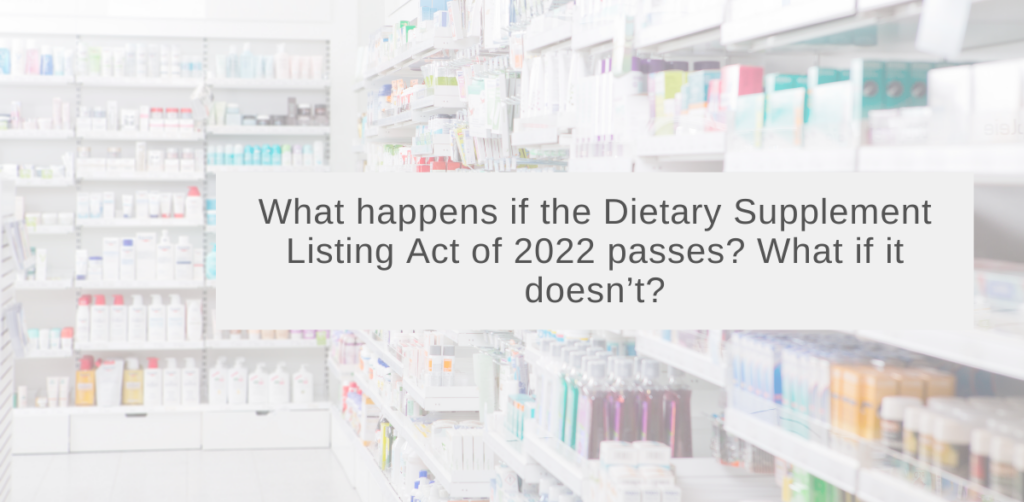Summary: This past April, Senators Richard Durbin (D-IL) and Mike Braun (R-IN) introduced the Dietary Supplement Listing Act of 2022. The first piece of legislation to propose regulations for the supplement industry since the Dietary Supplement Health and Education Act of 1994 (DSHEA) was passed, this bill has been met with criticism from both sides: with some saying it would be overly restrictive, expensive, and a hassle to implement, while others say that the bill doesn’t go far enough and is more for appearances than really enacting changes to protect consumers. So, what will actually happen if the bill is passed? And what if it doesn’t?
We recently published an article on the Dietary Supplement Act of 2022, and the potential dangers of supplements which led to the bill’s introduction. While the current lack of regulations have raised concerns with consumers and regulators alike, some say that that proposed bill would not achieve the intended effects.
What does the Dietary Supplement Act of 2022 propose?
If the Dietary Supplement Act of 2022 passes it would form a mandatory product listing (MPL) system, in which the manufacturers and suppliers of dietary supplements would be required to submit certain product information to the FDA prior to it being sold on the market (Hekking & Guggenheim, 2022).
This product information would include:
- The brand and proprietary name of the dietary supplement,
- An electronic copy of the dietary supplement label and any package insert,
- A list of all ingredients and the amount of each ingredient per serving,
- The conditions of use,
- The warnings and precautions,
- The presence of any major food allergens,
- The dosage form, and
- A list of health claims or structure/function claims.
The FDA would then take this information and create a database with unique identifying numbers for each product. This would easily enable consumers and regulators alike to gain transparency into the Dietary Supplement Industry. For instance, consumers would be able to determine which ingredients they are consuming and whether they have any adverse interactions, and the FDA could better enforce safety standards by having a list of which supplements are made by which companies.
Any new ingredient would require another listing. This would also be the case if a manufacturer wanted or needed to use an alternative ingredient. For instance, “if Kellogg switched from, say, high-fructose corn syrup to sucrose in its Frosted Flakes” (Jacobowitz, 2022).
The American Herbal Products Association (AHPA) estimated that the initial cost to the dietary supplement industry of complying with the new MPL requirements would be $20 million, noting that this “does not include associated training costs or other year-over-year costs of continuing compliance” (Grebow, 2022). On the government’s end, The Dietary Supplements Act of 2022 sets aside $4 million in the 2022 fiscal year to support the creation of the MPL database, and another $1 million every year after through 2026 ($8 million in total) (S. 4090 – 117th Congress, 2022). The AHPA’s Regulatory Affairs Director spoke to the MPL’s cost estimate, stating that it is an essential aspect to consider when deciding whether to support the proposed bill. This is particularly concerning to some others, after the last several years, as, between fires, droughts, and the COVID-19 pandemic there have been increasing need for companies to use alternative ingredients in their products, and the cost estimate does not include the maintenance of the database.
This being said, dietary supplement databases actually already exist. For instance, the Supplement Online Wellness Library (OWL) was formed in 2017 by the Council for Responsible Nutrition. In fact, other critics of the bill argue that the bill would not be enacting enough change, as it would merely be duplicating a resource which already exists (McGuffin, 2022). For, while participation in Supplement OWL is voluntary, it currently contains product information for over 13,000 products, and is widely used by the FDA and National Institutes of Health to gain insight into the market (Supplement OWL, 2022; Hekking & Guggenheim, 2022).

“I think this bill is a waste of taxpayer money” – Professor Pieter Cohen, Harvard Medical School Associate
What would it actually change?
Critics say not much, with less than 36 employees, the FDA’s office of dietary supplements is already over stretched, making it nearly impossible for them to enforce the new regulations on top of their current roles inspecting supplement facilities, issuing import alerts, and recalling hazardous supplements (Cohen, Acorn & Kesselheim, 2022).
The recent media reports of the potential dangers of dietary supplement consumption, however, has led to customer demand for tighter regulations regardless of who is enforcing them. To meet this demand, some retailers are taking it upon themselves to conduct third party testing of the products on their shelves. For instance, CVS guarantees that all the supplements they stock are, “free from harmful levels of heavy metals, pesticides, microbiological components, and other contaminants” (Melillo, 2022).
Moreover, dietary supplements companies are seeking out ways to guarantee the quality of their products, as this can make it easier to get into the marketplace, and differentiate one’s product. For instance, organizations such as NSF (National Sanitation Foundation) and U.S. Pharmacopeia (USP) will certify products, adding their label to supplements so that consumers can easily find products that meet certain, higher, standards than the current FDA requirements (NSF, 2022; USP, 2022).
As a contract research organization (CRO), Invivo Biosystems is here to help your company become compliant with the new safety and efficacy standards by providing the scientific data you need. Recently we announced our collaboration with ThaenaBiotics, where we were able to identify healthspan and lifespan benefits from their product ThaenaBiotic™ powder. Our scientific data demonstrated that Thaena’s complex mixture of small molecules produced by the microbiome could impact longevity and healthspan. Our novel scientific approach looking at how gut health and longevity are interrelated can support companies in the age-tech and longevity industry to deliver scientifically proven wellness products to the market.
Talk with one of our experts today to see how we can support your product goals.
References:
- Cohen, P., M.D., Acorn, J., M.D., Kesselheim, A., M.D, J.D., M.P.H. (2022). Institutionalizing Misinformation — The Dietary Supplement Listing Act of 2022. The New England Journal of Medicine
- Melillo, G. (2022). What safeguards are in place to protect supplement consumers, and are they enough? The Hill, https://thehill.com/changing-america/well-being/prevention-cures/3625693-what-safeguards-are-in-place-to-protect-supplement-consumers-and-are-they-enough/
- USP (2022). Building trust for over 200 years: A timeline of USP, https://www.usp.org/200-anniversary/usp-timeline
- NSF (2022). Mission and History. https://www.nsf.org/about-nsf/mission-history
- Jacobwitz, J. (2022). What is “Mandatory Product Listing”? WholeFoods Magazine, https://wholefoodsmagazine.com/columns/merchandising-insights/what-is-mandatory-product-listing/
- Grebow, J.(2022). Mandatory product listing requirements could cost dietary supplement industry $20 million for initial compliance, AHPA estimates, Nutritional Outlook. https://www.nutritionaloutlook.com/view/mandatory-product-listing-requirements-could-cost-dietary-supplement-industry-20-million-for-initial-compliance-ahpa-estimates
- The Dietary Supplement Listing Act of 2022, S. 4090, 117th Cong. (2022). https://www.congress.gov/bill/117th-congress/senate-bill/4090/text
- Supplement OWL (2022). Make the wisdom of transparency work for you. Supplement OWL website, https://supplementowl.org/
- McGuffin, M. (2022). AHPA: Mandatory product listing could restrict access to supplements. Natural Products Insider, https://www.naturalproductsinsider.com/regulatory/ahpa-mandatory-product-listing-could-restrict-access-supplements



